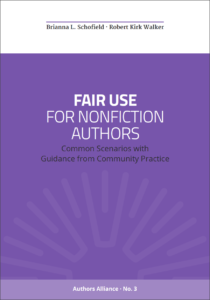
Authors who want to incorporate source materials into their writings with confidence may find themselves faced with more questions than answers. What exactly does fair use mean? What factors do courts consider when evaluating claims of fair use? How does fair use support authors’ research, writing, and publishing goals? Fortunately, help is at hand! This Fair Use/Fair Dealing Week, we’re featuring a selection of resources and articles to help authors understand and apply fair use.
Fair Use 101

Authors Alliance Guide to Fair Use for Nonfiction Authors: Our guidebook, Fair Use for Nonfiction Authors covers the basics of fair use, addresses common situations faced by nonfiction authors where fair use may apply, and debunks some common misconceptions about fair use. Download a PDF or purchase a copy today.
Authors Alliance Fair Use FAQs: Our Fair Use FAQs cover questions such as:
- Can I still claim fair use if I am using copyrighted material that is highly creative?
- What if I want to use copyrighted material for commercial purposes?
- Does fair use apply to copyrighted material that is unpublished?
Codes of Best Practices in Fair Use: The Center for Media and Social Impact at American University has compiled this collection of Codes of Best Practices in Fair Use for various creative communities, from journalists to librarians to filmmakers.
Fair Use Evaluator Tool: This tool, created by the ALA, helps users support and document their assertions of fair use.
Dig Deeper
U.S. Copyright Office Fair Use Index: The U.S. Copyright Office maintains this searchable database of legal opinions and fair use test cases.
Dr. Seuss, Picasso, and Grease: Learn about three current cases involving the doctrine of fair use working their way through the courts.
Fair Use and Text Data Mining: Explore the intersection of fair use and non-consumptive text mining in this new chapter on legal issues in text data mining.
Fair Use and Publication Contracts: Learn how to tell if your publication contract allows you to rely on fair use when you incorporate third-party content into your work—and options for negotiating if it doesn’t.
Discover more from Authors Alliance
Subscribe to get the latest posts sent to your email.
